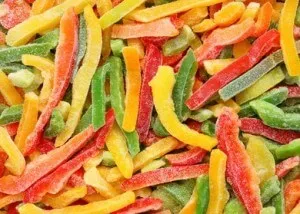
- Share on Facebook15
- Share on Pinterest
- Share on Twitter
Does the thought of hot boiling water and jars strewn all over your kitchen counter make you nervous? While canning as a method of food preservation has been done for hundreds of years, it is not the easiest method, or always the healthiest.
Sure you can cure, smoke or pickle, but all of these processes take time and can be complicated, as well.
But don’t fret, there are other ways to preserve food. If canning is not up your alley, why not try freezing? It is simple, inexpensive and effective.
Freezing
Investing in a freezer is a fabulous way to be sure that you have access to fresh food all year long. Be sure to keep your freezer only about two-thirds full so that air can circulate around your frozen food. If your freezer is under or over-packed it will not work as efficiently.
Keep two, 2-gallon plastic jugs of frozen water in your freezer in case the power goes out – the jugs will keep your food cold. Freeze foods at their peak ripeness; they are healthier and taste better this way. Letting food sit on your counter diminishes the enzyme content and can cause spoilage.
To freeze vegetables, be sure to wash and chop them first and then cook them in a large pot of lightly salted boiling water. Cook them until they are al dente – they should be firm. Don’t cook them too long or they will get mushy.
As soon as you have balanced the veggies, put them in a freezer-safe bag. Be sure to leave about a half-inch for expansion. You can keep blanched veggies for up to nine months in the freezer. Veggies that are typically not cooked, like lettuce, do not freeze well.
Some types of fruit, such as apples, discolor when sliced. To prevent browning, soak chopped fruit in acidulated water (1/4 teaspoon of ascorbic acid per quart of water). To keep the vibrant color of fruit, sprinkle some coconut sugar on it before you freeze it.
Berries freeze best on a cookie sheet. Once they are frozen you can transfer them to a vacuum sealer bag. They are great for adding to smoothies. Raspberries and blueberries do well with this method, but strawberries, not so great.
 Tips
Tips
- If you plan to freeze foods, keep a freezer inventory.
- Always adhere to a first in first out rule, that way you can use the oldest stuff first.
- The safest way to defrost foods is in the refrigerator, not on your counter or in the microwave.
- Use vacuum sealer bags, they work best with fresh or cooked foods. These bags take out all of the air, which helps foods to last longer.
If you are going to go to the trouble to peel, chop and blanch produce, why not go ahead and make up your favorite dishes as well? Roast veggies with olive oil and rosemary and freeze them, or make large batches of pesto in the food processor and freeze. A delicious fruit sauce made from fresh, local fruit tastes great drizzled on homemade frozen yogurt for a summertime treat.
-The Alternative Daily
Sources:
http://www.mnn.com/food/healthy-eating/stories/uncannily-simple-food-preservation-for-mere-mortals
- Share on Facebook15
- Share on Pinterest
- Share on Twitter

